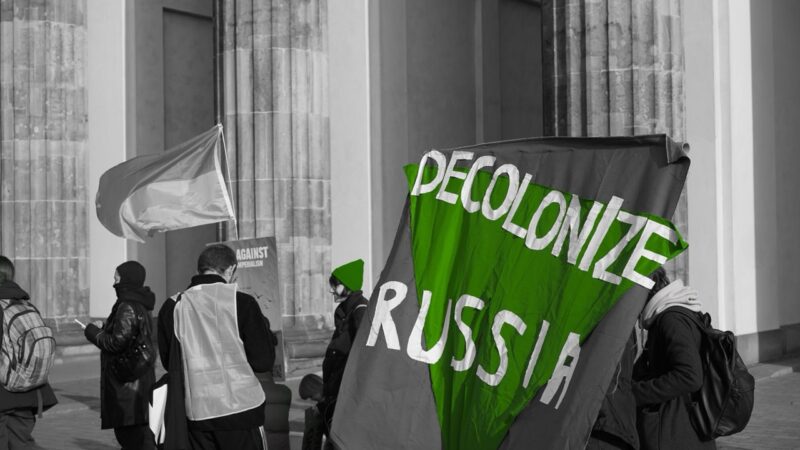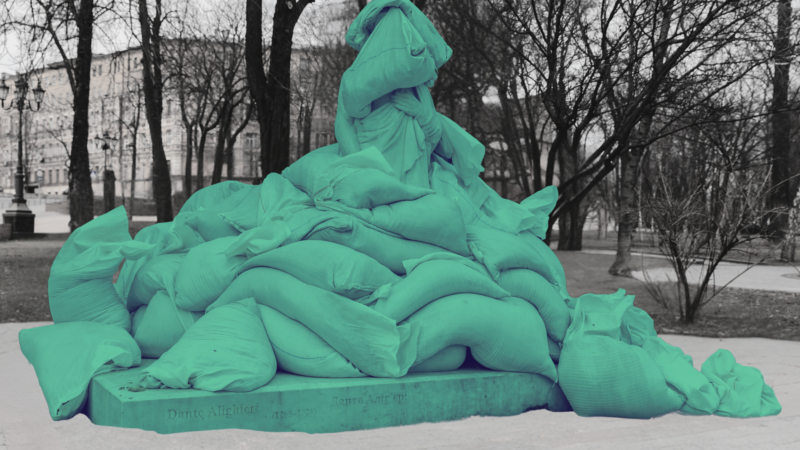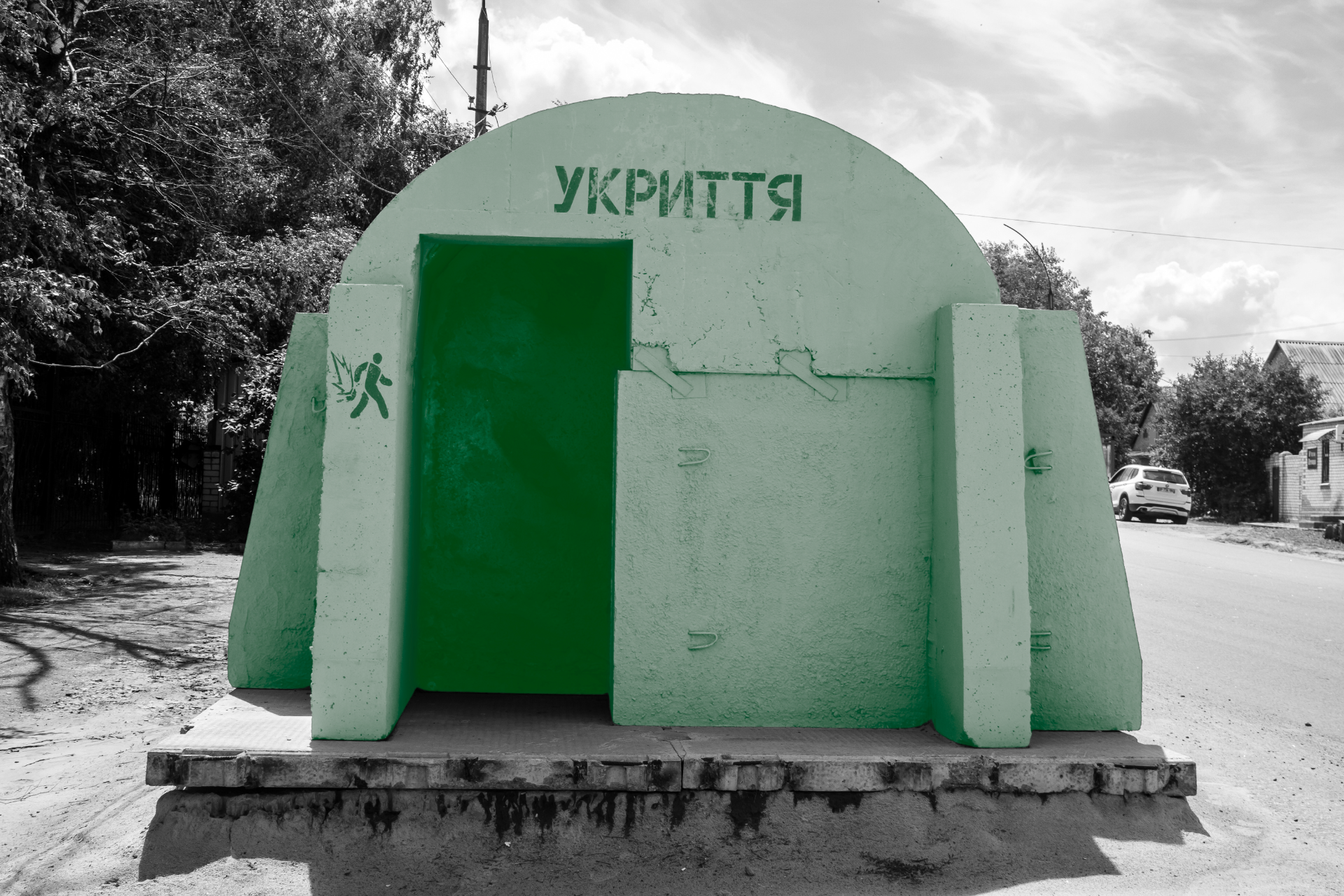Interview with Vitaly Chernetsky | Russia selectively and deceptively manipulates Western discourses

Oleksandr Pankieiev: You have been exploring the notions of postcolonialism and postmodernism in the historical and literary contexts of both Russia and Ukraine. How did Russia’s full-scale invasion of Ukraine affect the reconceptualization of those theoretical frameworks?
Vitaly Chernetsky: In the context of Russia, we have a throwback to pre-modern approaches to culture, state, and history—but in a very interesting fusion of selectively borrowed and applied concepts from various, more recent intellectual and technological global trends. Think about the world portrayed in Vladimir Sorokin’s novel Day of the Oprichnik, which imagines Russia’s near future that looks like medieval Muscovy of Ivan the Terrible time but with mobile phones, luxury cars, and the Internet. We have this strange hybrid of radically anti-modern developments and different elements of contemporary cultural philosophy they can choose from, as if at a smorgasbord.
Since Russia became aware of the ideas associated with postmodernism, around the early 1990s, there have been some interesting theoretical reflections. Post-truth is one of the very superficial ideas that became widespread and applied by people close to Russian government leadership. For them, there is no “truth and justice”; everything is language games. People can be manipulated, and everything is citational and potentially deceptive.
This very shallow caricature version of what postmodernism might be about was propagated and imposed very persuasively—taken on faith by the targeted consumers, as it were. It reminds me actually of Russia’s illusory embrace of capitalism in the 1990s. It felt like they took the negative Soviet propaganda image of evil, ruthless Western capitalists and transformed it into a positive, trying to emulate not actual practices on capitalist economy but those propaganda images they had internalized.
On the other hand, there is also the turn away from postmodernist literature and culture, which is very reflexive and playful, toward a new type of more direct expression, new forms of realism. We can see that a new drama arose in several countries in the post-Soviet space, including Ukraine and Russia. The whole movement started as a pushback against this hypertrophied, on the one hand, but superficially understood postmodernism.
As for postcolonialism, Russia’s paradox was that, for a long time, it completely ignored the discourse. And then, when some intellectuals discovered it in the early 2000s, they tried to adapt it to the idea that Russia was more of a victim of Western colonialist expansion than a perpetual rapacious colonialist offender in its own right. In this attempted adaptation, the narrative was cultivated (even though Russia was not directly colonized) that some semi-colonization had occurred in the 18th and 19th centuries. And then, notions of self-colonization or internal colonization were used to declare that Russian colonialism towards others was better, softer, and more enlightened than the supposedly more brutal and evil British and French versions. Russian scholars advanced a view that in their internal colonialist practices, the imperial elites were treating the ethnically Russian population of the Empire as badly, if not worse, than some of the other captive nations. This paradoxical, if not outright contradictory, interpretation became very entrenched.
They also looked at other models—for instance, the Latin American model of decolonial thinking and decolonial studies as opposed to the postcolonial, which was more associated with the anglophone and francophone world. Today, however, the full-scale invasion of Ukraine has changed things dramatically. The world sees Russia as a resurgent neocolonial empire, very aggressive in its colonial practices. This also sheds light on its colonialist practices and ruthlessness toward the indigenous communities that still live within the borders of the Russian Federation—especially the indigenous peoples of the North Caucasus region, Siberia, and the Far North—and it has brought greater awareness to those issues.
Today, we also see on the global stage that Russia is desperately seeking allies. It aggressively courts many countries in the Global South—at least, their intellectual elites and leadership. It selectively and strategically uses the language of anticolonial, postcolonial, and decolonial discourses to its advantage, and this is a very serious and troubling issue.
Many people from the Global South and Western academia whose research is focused on the Global South were deceived by this Russian rhetoric. They are obsessed with the idea that the 20th century was dominated by a “Pax Americana,” and they are happy to see the American dominance, which they know how to criticize, destabilized; as such, they are willing to overlook the dangers of neo-authoritarian players on the global stage, like Russia and China. Anything that weakens the US and its global influence is good to them. In this sort of strange logic, they become supportive of Russia’s and China’s most horrible policies on the international stage.
Pankieiev: The need for decolonization of Russian studies and a reconsideration of how Russian history and literature courses are being taught at universities are increasingly discussed. What questions are on the top of the agenda in those discussions? What is your overall opinion about the need for decolonization of this field?
Chernetsky: There is an urgent need to rethink and reframe how Russian studies are conceptualized and taught, a need for a fundamental transformation. It requires deep, critical interrogation of many received ideas, stereotypes, and narratives that are entrenched in how they have been taught at the secondary and undergraduate levels. For instance, if you look at most syllabi on “Introduction to Russian History,” or “Introduction to Russian Studies,” or “Russian, East European, and/or Eurasian Studies” courses, the Kyivan Rus period is often presented as part of Russian history without any awareness of controversies.
The projection of that is part of the uncritical absorption and recycling of the narrative that was brought by the early Russian émigrés to the West and was taken on faith by American, Canadian, and Western European students, who reproduced it in the teaching of this and various other periods, including the Soviet era, and in teaching Soviet culture. Even the periods of relative internationalism, such as the policies of indigenization pursued in the 1920s, for example, you would not see covered in most publications or courses taught by Western scholars. They were entirely Russo-centric—or even Moscow or St. Petersburg-centric. The prejudicial position was that everything interesting happened in the capitals, and everything outside was provincial, dull, uninteresting, and unimportant. Moreover, the approach itself is troubling in multiple respects—denigrating other cultures and dismissing them pre-emptively, if not appropriating their identity, history, and material culture outright. Addressing this is something I have been advocating within the broader process of interrogating dominant paradigms and spotlighting the hidden presence of colonial attitudes in texts, in the works of visual arts, cinema, and in the cultural discourse. It needs to be made visible.
For example, this semester, I am teaching a course on gender, sexuality, and social justice in Eastern Europe, the former Russian Empire, and the former Soviet Union that I reformulated to make it decolonially diverse. And we were just discussing with students Chernyshevsky’s What is to be Done? and the famous fourth dream of Vera Pavlovna, the utopian vision of society of the future. In our discussion, my students and I noted an avid embrace of colonialism there. The utopian society of the future has “New Russia” as well as other colonized territories.
Moreover, Vera Pavlovna asks the guide in the dream, “Is this where Odesa and Kherson are?” but the guide explains that it is not Odesa and Kherson and that it is a different territory that is being colonized now: “This was in your time, and now, look where New Russia is.” We can tell that the lands described correspond to Central Asia, which was indeed actively colonized in the 1860s when Chernyshevsky wrote the novel. This is something that, historically, very few people paid attention to. But now, all of a sudden, this jumps at you from every page. I have written about this in a chapter on Empire for the new Cambridge History of Russian Literature.
In this chapter, I use the term imperiality by analogy with the term “coloniality.” Coloniality of power—a term in decolonial theory—is when somebody or something, a work of culture or cultural phenomenon, is not actively participating in a colonialist project but is still enabled by structures of power that are colonial in their origin, and this is something that endures even after overt official colonialism may be over. If we look at Russian culture, we have this situation with imperiality and coloniality in approaches fundamentally pervading it in the texts of both official and dissident writers, in texts both liberal and conservative; it is deeply present there. While it has become standard and common to talk about these things in the context of British, French, or Dutch imperialism, it has not been discussed with respect to Russian imperialism—which is important to change.
In terms of bringing voices forward, it is essential to confront and overcome epistemic injustice. It is a relatively recent term in philosophical discourse that comes from feminist philosophy but has broader application to racial and colonial injustice. Within the discourse of epistemic injustice, philosophers talk about one particular kind: pre-emptive testimonial injustice. It is when it does not even occur to those in positions of power—the privileged knowers, as described in this discourse—that somebody speaking from a different subject position, from a different situated experience, has anything of value to contribute. They pre-emptively dismiss viewpoints, experiences, and rich textured knowledge from that position because they think it is not interesting and does not contribute to anything. This is something that both Ukrainians and representatives of other cultures that were oppressed and marginalized within the context of the Russian and Soviet Empire had been dealing with—an excessive epistemic burden. They and their cultures were oppressed, but on top of it, representatives of these oppressed cultures carried the burden of expressing it to the dominantly situated. The dominantly situated, in turn, may well choose not to pay attention to those contributions to shared knowledge, as opposed to actively trying to change their attitudes. So this is a bigger problem.
We now see many Western Slavists and specialists in Russian, East European, and Eurasian Studies waking up to these problems, actively trying to rethink how they might approach and transform their teaching and research. However, quite many are still resistant, think of this as a temporary annoyance, and wish that those Ukrainians and all other pesky marginal people would go back to the dark, obscure mouseholes they came from and not bother them in studying their great culture, because they all know that it is great. Then it becomes a circular reasoning—that it is great because it is Russian. So yes, it is a big problem, and much still remains to be done. Changes are happening, but we still have a very long road ahead of us.
Pankieiev: We hear much lamenting about the cancellation of everything Russian. What is your opinion about this?
Chernetsky: It is, again, an interesting case of Russian discourse selectively and shallowly appropriating from the Western media and public discourses. It is a frequent complaint of privileged people who are hetero, white, and mostly male, who have had unproblematic access as experts and opinion makers to the media, university lecturer podiums, and publications, whom people from disempowered or marginalized positions then challenge. It is this very selfish and dangerous precedent, them saying, “Woe is me, I’m being cancelled!” They thus create more noise and continue being very visible and vocal about it. But nobody can cancel them, as they dominate the discourse, sucking all the oxygen out of the room.
This tactic is mainly used by conservative, reactionary media personalities in the United States and elsewhere, and some representatives of the Russian cultural elite have appropriated it. They use it the same way as some nefarious folks in the United States. Even while much anti-Americanism is happening in the Russian cultural discourse, we also see this use of what was occurring within the domestic United States debates, reappropriating it and trying to use it strategically. For me, it is an entirely spurious and manipulative discourse. Whenever I hear anyone talk about “cancel culture,” I immediately think something nefarious and problematic is afoot; it basically entails fighting a fictional enemy that they themselves have created. It becomes a way of whipping up emotions, being manipulative, and then projecting all this onto folks from historically marginalized positions, saying, “You are a nasty person, you hate me, while I am all fuzzy and innocent.”
In all instances, this is a very pernicious discourse that needs to be called out. It needs to be resolutely rejected, as it absolutely has nothing to do with the actual situation of efforts to diversify culture and highlighting that within Russian culture, there are problematic aspects, as well as the fact that in many cases, the overly visible presence of Russian culture in a given region—and invisibility of the cultures of other countries of that region—is the result of either ignorance by those in positions of power or their laziness.
A good example would be classical music. So many orchestras in the West to date have not even bothered to include even one short piece of Ukrainian music in the programming of their annual season. We are talking about a year and a half since the start of the full-scale invasion and soon to be ten years since the beginning of the war with the invasion of Crimea. And some of them just do not know—they claim—that good Ukrainian music exists. Yet we have everything here: if you want notes or scores, they are available. If you want Baroque, there is Baroque; if you want avant-garde, there is avant-garde—all those genres. It is just intellectual laziness on the part of orchestra management and artistic direction. Meanwhile, Tchaikovsky has not diminished, nor have Shostakovich or any other (so-called) great composer.
Similarly with Russian literature: just a couple of issues ago The New Yorker devoted a good five pages in its print edition to reviewing the latest translation of The Brothers Karamazov and explaining that while Dostoevsky may have been a nasty person, it is a work of genius that every self-respecting person must read and appreciate. In sum, there is absolutely no danger of Russian culture becoming invisible, obscure, or oppressed. This is a spurious discourse.
Pankieiev: What is the role of literature and art in Ukraine as a nation defending its land and identity and charting a path after the war?
Chernetsky: The cultural sphere, including literature and arts, cinema, music, and theatre, is very important. If we agree that a nation is an imagined community—in the sense that it is a community that actively imagines itself and tries to think about what binds it together—the shared cultural legacy is hugely important. This is why we must counter—both domestically within Ukraine and on the international scene—any and all dismissive, divisive discourses that denigrate Ukrainian culture and stereotype it as supposedly second-rate, of marginal importance. One of the sad consequences of colonialism is that many Ukrainians have also internalized this narrative. Although it has been 30-plus years since Ukraine regained its independence, valuing Ukrainian culture, past and present, as rich, innovative, and worthy of attention has not yet been embraced by all Ukrainians, including Ukrainians who consider themselves part of the intellectual elite or the decision-making groups. We see this happening within Ukraine, and we also see this happening on the global stage. Suppose we want people to support Ukraine more. In that case, it should not be just negatively defined by nasty things that others do to it. It also needs to be associated with cultural richness that can be shared with the world and can teach the world something.
Therefore, it is essential in the educational environment to make sure that Ukrainian cultural products are visible. There should be specialized Ukraine-focused university courses, thematic exhibitions, film retrospectives, etc. But we also need to ensure that Ukrainian content is present in academic courses, theoretical books and discussions, thematic anthologies, and art exhibitions that are not exclusively focused on Ukraine. Ukrainian culture has much to share on a wide range of topics. One of the classic examples is Taras Shevchenko’s poem “Kavkaz”—a pioneering, thoughtful articulation of anticolonial solidarity of the oppressed, written in the 1840s, a long time before these ideas were found elsewhere.
Speaking of postcolonial and decolonial theories, how much richer and more textured would they have been if the folks who articulated them in the mid-twentieth century had been aware of what Shevchenko wrote a century earlier! It would have been a very different story now. So, we are now belatedly catching up. Nevertheless, the world is now seriously paying attention, and we need to ensure that there is this recognition of how much Ukrainian thought and Ukrainian culture can contribute to the widest variety of topics, not just ghettoized, Ukraine-specific ones.
Pankieiev: As a translator, sharing Ukrainian culture is something that is important to you. What messages are you hoping to get to readers and the public through your work?
Chernetsky: Translation has been one of the most enjoyable parts of my intellectual work. And it became an essential creative outlet for me as well. I began working on translations more than 30 years ago when I had just started graduate school here in the US. It happened because I was excited about fun, innovative texts I knew in the original, and I wanted to share them with my American friends. We have wonderful, talented people whom we enjoy reading, and this is worth sharing with others–this has been my approach ever since. I have participated in a lot of different projects. In most of my translations, whether it would be a few short pieces for an anthology of poetry, short fiction, or a novel, I try to meaningfully invest in building cultural bridges—in communicating ideas between cultures—so that more dialogue is happening.
As with all cultural work, one must know that the proper or deserved response might take time. For instance, the English translation of The Moscoviad by Yuri Andrukhovych, which I did more than 15 years ago, has been rediscovered and appreciated much more within the field of Slavic East European and Eurasian studies in the context of the full-scale invasion. I am now seeing this book assigned to university courses all over the English-speaking world. This is also the case with many other translations of various Ukrainian writers I have done. Fortunately, we see them now involved in this global exchange of ideas, opinions, and aesthetic experiences. They have a voice and a presence. In this sense, translation—in both the narrow and the broader sense—is a hugely important enterprise because it creates new relationships between creators and audiences and engages with new audiences who otherwise would not have had access to this kind of work.
Translation—when it is successful—in some way becomes a co-creation of meaning, because you are carrying the ideas of the original. You are making informed decisions on the most effective way to bring the riches of the original work to new audiences who might not know all the local contexts from which the work came. But you want to ensure that they still appreciate the many nuances of that work. So, it is both a science and an art. There is a delicate balance involved. And it is an inspiring and culturally rewarding activity.
Pankieiev: You, among others, have noted a positive change in the acceptance of LGBTQ people in Ukraine. What has been behind this, and do these developments suggest other changes in Ukrainian society?
Chernetsky: Since the start of the full-scale invasion, we have witnessed many segments of Ukrainian society thinking more about the war, about the aggression that Ukraine is heroically repelling and fighting as a war of values, mainly because the aggressor—contemporary Russia, at the state level—has embraced all the extremely right-wing, obscurantist, and oppressive ideologies and practices. It has propelled more Ukrainians to think of this conflict not as a conflict that is geographic or ethnic but as one that is based on values—and also that the Ukrainian nation is not defined ethnically but by the cultural values that we share and embrace. The fact that diversity—including the presence of the LGBTQ community within the diverse spectrum of the nation—is something that the Kremlin attacks so viciously in its official discourse has pushed many Ukrainians to rethink their attitudes.
Also, the fact that we have so many “out” queer Ukrainian folks fighting on the front lines, defending the country, has shattered many negative stereotypes that were strangely persistent and enduring. Thus, since the start of the full-scale invasion, we have seen a strong shift within Ukrainian society in terms of positive attitudes toward the queer community. There is now a solid chance of legal recognition and protection of same-sex unions through civil partnerships.
Ukraine is moving in a very progressive direction. We see the embrace of values of equality, diversity, and inclusion being taken seriously, and they have become understood, unquestioned, evident, and normal, especially for the younger generations of Ukrainians. In thinking about the values they defend and global cultural engagement, they see the aspirational model of what we want the future of victorious Ukraine to be after the enemy is defeated and peace returns to the Ukrainian lands.






One thought on “Interview with Vitaly Chernetsky | Russia selectively and deceptively manipulates Western discourses”